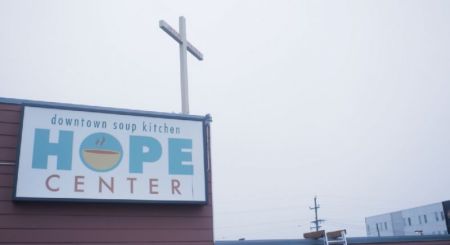Christian women's shelter won't be forced to admit trans-identified males, federal judge rules

Amid a yearslong legal battle, a federal judge ruled this week that the city of Anchorage, Alaska’s nondiscrimination ordinance barring LGBT discrimination does not force a Christian battered women’s shelter to admit trans-identified biological males.
In an order handed down Monday, Judge Sharon Gleason of the U.S. District Court for the District of Alaska determined that Downtown Soup Kitchen Hope Center of Anchorage does not have the standing to sue the city over a revision to its ordinance declaring that places of public accommodation can’t discriminate based on sexual orientation or gender identity because the center is not a place of public accommodation.
Therefore, the faith-based homeless shelter created to serve battered women fleeing domestic abuse and homeless women, part of a ministry to the underprivileged that includes a soup kitchen, will not have to admit trans-identified males.
Gleason granted in part a motion from the city to dismiss the case due to lack of standing as the municipality contends that the statute does not apply to the Hope Center’s shelter operations. According to the ruling, the city cited the U.S. Supreme Court’s ruling this past summer in favor of a Catholic foster care agency removed from Philadelphia’s foster program over policies preventing placement of children with same-sex couples.
The municipality contended that the Supreme Court ruling “makes clear that Hope Center is not a public accommodation.”
The judge ruled that the Hope Center “may seek damages for its self-censorship based on that provision for the limited time period between the ordinance’s passage and the Municipality’s disavowal of prosecutorial intent” because “section 5.20.020 arguably
applies to Hope Center’s conduct.”
Attorneys for Alliance Defending Freedom, a conservative religious liberty legal nonprofit representing the center, praised the judge’s order.
“Vulnerable women deserve a safe place to stay overnight, and we’re pleased that they can sleep soundly, at least for the time being, due to the court’s order,” ADF Senior Counsel Kate Anderson said in a statement. “Downtown Hope Center serves everyone, but its overnight women’s shelter exists to provide a safe place for women, many of whom have survived sex trafficking, rape, or domestic violence at the hands of men.”
Anderson said that Anchorage officials have twice “targeted the center for operating according to its religious beliefs and for serving the city’s homeless population.”
She hopes that “the court’s order puts an end to this.”
“Faith-based nonprofits should be free to serve consistently with their faith without fear of unjust government punishment,” stated Ryan Tucker, director of ADF’s Center for Christian Ministries. “This is especially true for ministries that help homeless women who have suffered sexual abuse or domestic violence. Because no woman should be forced to disrobe next to a man, we are pleased the court has allowed Downtown Hope Center to continue protecting women and operating according to its religious beliefs.”
Monday’s decision stems from years of litigation that began when a trans-identified male, referred to as “Jessie Doe” in the lawsuit, filed a complaint with Anchorage’s Equal Rights Commission in 2018.
Doe alleged that Downtown Soup Kitchen Hope Center violated the Anchorage Municipal Code by refusing admission to the shelter. Doe allegedly showed up drunk and injured. The charity contends that it referred Doe to a hospital and paid for a taxi ride.
At the time, the municipal code declared it unlawful for a place of public accommodation to “refuse, withhold from or deny to a person any of its accommodations, advantages, facilities, benefits, privileges, services or goods of that place on account of … sex [or] gender identity.”
The Equal Rights Commission filed a complaint against Downtown Soup Kitchen Hope Center, accusing it of unlawful discrimination.
Later that year, the center filed a lawsuit against the city. ADF insisted in a legal brief that the shelter did not have to abide by the nondiscrimination provision because it was not a public accommodation but a religious ministry.
While a federal court sided with Downtown Soup Kitchen Hope Center in 2019 and city officials subsequently dropped their lawsuit on behalf of Doe, the city amended the municipal code earlier this year in what religious liberty advocates saw as an attempt to force the shelter to admit trans-identified males.
The Anchorage Assembly altered the definition of “public accommodation” to include facilities “of any kind, whether licensed or not, whose goods, services, facilities, privileges, advantages or accommodations are made available to the general public.” Previously, the definition of “public accommodation” only applied to a “business” or “professional activity.”
In a previous interview with The Christian Post, attorney Christy Allen alleged that Anchorage was “displeased” with the earlier court ruling finding that “the initial laws did not apply to Downtown Hope Center” and “they rewrote the law to basically include homeless shelters within those definitions.” The change to the definition prompted the Downtown Hope Center to file another lawsuit against the city, the claims of which Gleason addressed in her Monday ruling.
Ryan Foley is a reporter for The Christian Post. He can be reached at: [email protected]





















